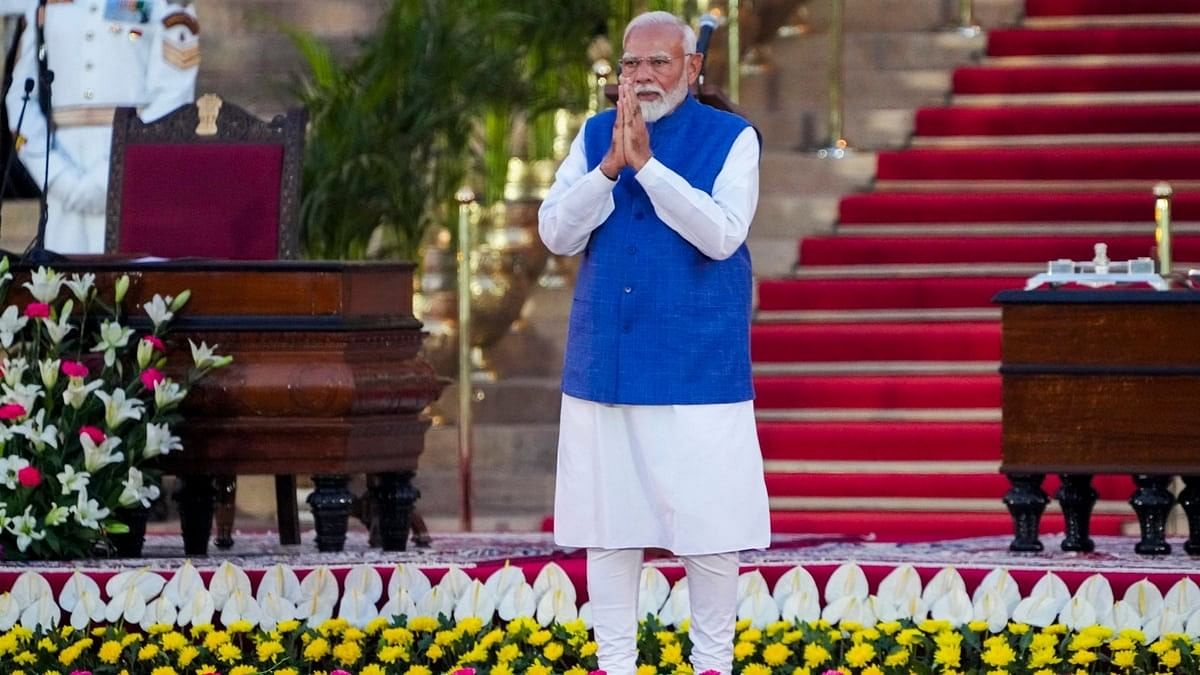
Narendra Modi
Credit: PTI Photo
Infallibility and indispensability have long been central to India’s public discourse, especially during election seasons. Leaders, often perceived as irreplaceable, primarily due to their charisma rather than their actual skills and knowledge, frequently spark debates.
Supporters of these leaders vehemently assert their indispensability, portraying them as infallible and invincible figures. This perception is amplified when the leaders themselves contribute to this narrative, sometimes claiming divine powers. Such assertions intensify the fervour among their followers, creating a deep resonance and leading to spontaneous comparisons with deities.
This phenomenon underscores the potent mix of personality cults and the mythologizing of political figures, reflecting broader cultural tendencies to elevate individuals to almost sacred status. In this context, the political landscape becomes a stage where charisma can overshadow competence and the constructed image of a leader wields more influence than their tangible achievements or abilities.
Such adulation is not confined to politics but also permeates other realms, including business, sports, films, and academia. Charismatic leaders become central figures around whom powerful narratives are constructed. For instance, in the film industry, actors are worshipped, and fans go so far as to build temples in their honour. In sports, some are elevated to a near-divine status, a practice that dates back to ancient Greece, where exceptional athletes were sometimes deified.
Handling this admiration is the real test for leaders who attract a fervent following. The external pressure to live up to a larger-than-life image can be immense. However, some leaders remain grounded, navigating the storm rationally and objectively. These leaders are acutely aware of their strengths and limitations, recognising the transient nature of their positions. They understand that their indispensability is an illusion and that they will eventually be forgotten. Despite the flattery and ego-stroking from sycophants, they stay rooted. Conversely, some leaders succumb to the allure of adulation, falling into the trap of believing in their own infallibility and indispensability. Disconnected from reality, they may even start to hallucinate. This dichotomy between grounded leaders and those trapped by constructs highlights the importance of self-awareness and humility in positions of power and influence.
Research shows that several factors contribute to leaders believing in the illusion of indispensability. Psychologists note that narcissism provides such leaders with an inflated sense of their importance, driving a constant craving for admiration and attention. Another significant factor is hubris, which manifests as excessive pride and self-confidence, leading to reckless decisions and an inability to acknowledge mistakes. Some scholars, however, consider it an occupational hazard for powerful leaders, especially politicians, business executives, and military officials. In addition, there is strong evidence that leaders surrounded by a coterie of yes-men experience reinforcement of their beliefs and decisions, resulting in confirmation bias. The groupthink mentality also contributes to this as it prioritises consensus over critical thinking, suppresses dissent, and encourages leaders to believe their decisions are always right. Common characteristics of such leaders include overconfidence, a tendency to micromanage, undermining opposing views, labelling critics as uninformed or malicious, thriving in grandiosity, and resistance to delegation.
It is common knowledge that leaders who succumb to the belief in indispensability often make critical errors that can lead to their downfall. In politics, figures like Hitler, Nixon, Mugabe, Gaddafi, and Ceaușescu are notable examples. Gaddafi’s failure to meet his people’s needs and Ceaușescu’s oppressive rule until his execution in 1989 highlight the dangers of such hubris. In business, Steve Jobs, co-founder of Apple, was known for his strong belief in his ideas and resistance to dissenting views. Elizabeth Holmes, founder and CEO of Theranos, failed due to her perceived indispensability; Adam Neumann’s overconfidence led to the devaluation of WeWork; Jeff Skilling’s Enron faced bankruptcy; and Eike Batista’s business empire collapsed for the same reasons. These cases illustrate the harsh consequences of hubris and infallibility. In extreme cases, leaders may even delude themselves into thinking their mistakes and wrongdoings are divinely sanctioned.
To avoid such pitfalls, leaders must have a learning mindset and foster humility, self-awareness, and accountability. Practical steps could include promoting diverse opinions, implementing regular feedback mechanisms, and establishing clear succession plans. They must learn organisational behaviour, leading to awareness of the dangers of overconfidence and the benefits of diverse team dynamics. Lastly, regardless of one’s position in politics, business, movies, or academia, it is crucial to recognise that organisations are not dependent on any single individual.
(The writer is professor and dean at Christ (deemed to be) University, Bengaluru)